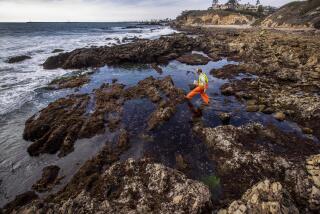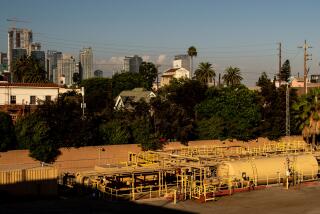Oil Companies Expand Plan to Respond to Major Spills : Environment: Firms will spend $800 million to establish five regional centers capable of reacting around the clock to disasters in U.S. coastal waters.
- Share via
Leading oil companies have agreed to spend $800 million--more than three times their earlier estimate--to staff and equip five around-the-clock teams capable of quickly responding to a major oil spill anywhere in U.S. coastal waters, industry sources said Wednesday.
The regional response centers, to be announced by oil industry executives today in Washington, D.C., are at Port Hueneme, Seattle, Lake Charles, La., the New York-New Jersey area and Port Everglades, Fla.
In California, satellite staging areas are planned in San Diego, Los Angeles and San Francisco. The centers will be staffed by 64 full-time personnel.
The response centers are expected to be operational within 2 1/2 years, and will augment existing cooperatives that are not equipped to deal with a major oil spill.
The chief executive officers of 14 major oil companies organized a task force after the disastrous March 24, 1989, Exxon Valdez spill that dumped 11 million gallons of crude oil into Alaska’s Prince William Sound. The task force quickly concluded that the petroleum industry had “neither the equipment or the personnel” to handle a catastrophic tanker spill.
“If oil is spilled close to a shoreline and if the drift of the oil caused by wind and current is onshore, it is unlikely that anyone can prevent shoreline contamination, no matter how ideal the conditions,” the task force warned.
Last February, two environmental groups completed a yearlong study that found that oil tanker traffic to Los Angeles, San Francisco, and New York harbors is so heavy--at least 1,000 tanker visits to each port annually--that a major oil spill was inevitable.
This study came weeks after the 394,000-gallon spill off Huntington Beach from the tanker Pacific Trader.
The 14 petroleum companies had pledged to spend $250 million over five years to fund the “Petroleum Industry Response Organization” (PIRO). By comparison, Exxon spent more than $2 billion to clean up the Alaska spill.
The organization will be renamed the Marine Spill Response Corporation and will be headed by retired Coast Guard Vice Adm. John D. Costello.
An estimated $60 million will be spent to set up the Port Hueneme response center. The Seattle center will cost $46 million, with staging areas planned for Astoria, Ore., Bellingham, Wash., Port Angeles, Wash., and Alaska.
Each center, industry sources said, will be able to respond to a spill of 216,000 barrels, or about 9 million gallons. If there is a larger spill, regional centers would join forces to respond, industry sources said.
Despite the effort by the industry, critics have been skeptical that even a small spill can be satisfactorily cleaned up, not to speak of a Valdez-size accident.
Oil spill cleanup technology is considered fairly primitive, involving the skimming of surface waters, the use of chemical dispersants to break up the oil, or cleaning up beaches after the fact.
Skimmer boats lose their effectiveness in seas that are any higher than 2 1/2 feet. While dispersants in use today are less toxic than earlier formulas, their use continues to be controversial.
Nonetheless, major oil companies have been under pressure, both within and outside the industry, to improve their ability to respond to spills.
Since the Exxon Valdez spill, the petroleum industry has paid a heavy political price. Congress has delayed any consideration of drilling in the Alaska National Wildlife Refuge. In California, the state Lands Commission has prohibited any new leases in state waters.
Under Congressional pressure, President Bush was forced delay new oil leases off California.Last week, the California Legislature approved a bill by Sen. Barry Keene (D-Benicia) that would slap a 25-cent-a-barrel tax on oil companies to raise $100 million to establish an oil spill cleanup fund. Gov. George Deukmejian is expected to sign the measure.
“After what happened in California, they realize every other coastal state may pursue similar legislation. I suspect they are trying to head off piecemeal approaches,” California Energy Commission Chairman Charles R. Imbrecht said Wednesday.
Congress approved legislation requiring that oil tankers be double hulled.
Among the major oil companies participating in the regional response centers are ARCO, Unocal, Texaco, Sun, Shell, Phillips, Mobil, Exxon, Conoco, Chevron, U.S.A. and British Petroleum.
In addition, shippers, owners and receivers of crude oil, such as electrical utilities and independent tanker operators, are expected to participate, industry sources said.
The industry also is expected to announce a research program to improve oil spill response technology.
More to Read
Sign up for Essential California
The most important California stories and recommendations in your inbox every morning.
You may occasionally receive promotional content from the Los Angeles Times.













